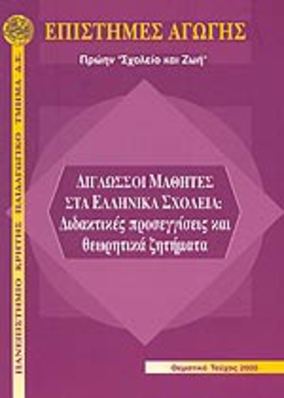Τρόποι διδακτικής διαχείρισης επίμαχων και τραυματικών ιστορικών γεγονότων ή γεγονότων-Tabbou στη σχολική τάξη : οι μεθοδολογικές προτάσεις του James Percodo και της Simone Schweber και το δίλημμα "ευγενικά ψεύδη ή ανήθικες / ενοχλητικές αλήθειες στο μάθημα της ιστορίας"
Part of : Επιστήμες Αγωγής ; No.4, 2008, pages 7-39
Issue:
Pages:
7-39
Abstract:
This article investigates the relationship between Epistemology of History and Didactics of History in reference to the teaching of controversial historical topics at school.The nowadays prevailing ideas of (a) presentism, which uses the historical past as its self- justifying instrument, and especially (b) teleology, which presents the historical evolution as a process of steady progress, in spite of temporary inconsistencies, both prevent (a) the acknowledgement of multiperspectivity, which is in fact inherent in every pluralistic society, as well as (b) the understanding of the cost of historical developments to the detriment of the less advantaged social groups. Nevertheless, the historical education acquires its true meaning in so far as it helps the students to cope with inconsistent and conflicting views by gradually constructing a personal, reasonable, sufficiently substantiated, and responsible opinion. According to the writers' point of view, this might be achieved, first of all, through the dealing with controversial historical issues, which yet have been concealed with silence regarding the traditional norms of school history. The methodology appointed by James Percoco (2001 ) and Simone Schweber (2004) -two educators working in the high schools of U.S.A.- point precisely to this direction. The first, using a wide variety of methods and teaching materials, and the second, focusing on the Holocaust as a major case study, both make clear crucial sides of their reliable didactic and, at the same time, historical approaches. The keys of their proposals lie (i) in the high degree of engagement -of the children and their educators as well- accomplished basically through the method of project, (ii) in the development of the skill of empathy, (iii) in the interpretative comparison of plenty, various and controversial historical sources, (iv) in the evolving of the school class into a real forum of discussions and research (into a "Laboratory of History"), and last, but not least, (v) in the indispensable cooperation among caring teachers, despite the notorious isolation in the practicing of the educational profession.
Subject:
Subject (LC):
Keywords:
παροντισμός, προοδοκεντρισμός, πολυπρισματικότητα, ιστορική εκπαίδευση, επίμαχα ζητήματα, ενσυναίσθηση, εμπλοκή, αντιπαραβολή μαρτυριών, μέθοδος project, forum συζητήσεων, εργαστήρι ιστορίας, ενοχλητικές αλήθειες, ευγενή ψεύδη
Notes:
Περιέχει βιβλιογραφία




